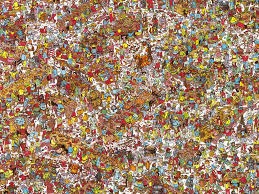Buddha once said, “Three things cannot be long hidden: the Sun, the Moon, and the Truth.”
Yet in today’s world, Truth often feels like Waldo—hidden in plain sight, obscured by a sea of distractions.
🧩 The Waldo Effect: Truth in a Misinformation Landscape
Imagine Truth as Waldo in a crowded scene.
- The rest of the image? Misinformation, misdirection, and noise.
- Journalists, media outlets, and official reports often serve as the background—colorful, detailed, but ultimately misleading.
Martin Armstrong once argued that exaggeration is the golden rule of disinformation:
“The Feds knew what they were up to and allowed it to happen... They exaggerated everything to destroy any credible investigation. This makes anyone who questions 9/11 a conspiracy nut job. Perfect cover to hide the truth right in front of your eyes.”
This strategy doesn’t just obscure the truth—it weaponizes ridicule to silence dissent.
🧠 Conspiracy vs. Principle
Conspiracy theories often derail themselves by abandoning principle and resorting to Ad Hominem attacks.
- Blaming shadowy groups like “the Illuminati” or “the Rothschilds” dilutes legitimate inquiry.
- Ephesians 6:12 reminds us: “We wrestle not against flesh and blood, but against principalities.”
The real battle is against systems and ideologies that prioritize ego and control over truth and cooperation.
📰 The Press and the Engineering of Consent
John Swinton, former chief of staff at the New York Times, said in 1880:
“There is no such thing... as an independent press... We are intellectual prostitutes.”
Edward Bernays, Freud’s nephew, pioneered public relations and authored books like Propaganda and The Engineering of Consent.
- His work laid the foundation for manipulating public opinion through psychological and sociological techniques.
- Truth became a nuisance—something to be managed, not revealed.
🎮 Game Theory: The Rules Beneath the Surface
Game theory reveals how individuals and groups strategize in competitive environments.
- Cooperative games foster long-term sustainability.
- Non-cooperative games drive short-term gains, often at great cost.
Richard Dawkins’ documentary Nice Guys Finish First explores the Prisoner’s Dilemma and the success of the Tit for Tat strategy—cooperate unless provoked, retaliate if necessary, but always be quick to forgive.
🌳 Good Trees, Good Fruit
Matthew 7:16–20 offers a simple test:
“By their fruits you shall know them.”
If the system produces corruption, it’s a corrupt system.
- Today’s game rewards materialism, misinformation, and exploitation.
- The top players consume the Truth, profit from it, and discard the consequences.
💸 Money, Time, and the Value of Truth
Money has become the driver of society, but no one’s steering:
“When money does all the driving... This is empire baby. And this train ain't stopping until it derails.” —Wu-Li
Like money, time loses value when spent chasing illusions.
- “Time is money” becomes a warning: inflation of lies devalues our lives.
🌅 A New Enlightenment?
Alexander Pope once said:
“Men must be taught as if you taught them not, and things unknown proposed as things forgot.”
Truth doesn’t need to be hidden—it needs to be reframed.
- Make virtue profitable.
- Teach children new rules.
- Build a cooperative game where the best of humanity thrives.
🧭 Final Thought: Finding Waldo
Truth is there. It’s always been there.
But like Waldo, it takes effort to find.
And maybe that’s the point—if Truth were too easy to find, it wouldn’t be valued.


No comments:
Post a Comment